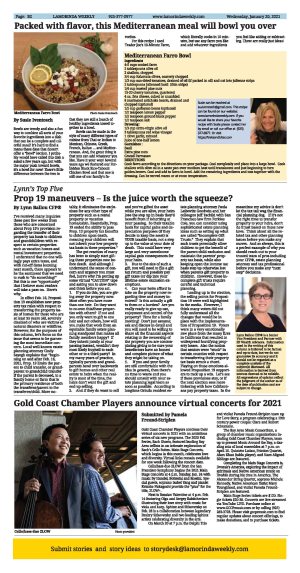| | Published January 20, 2021
| Lynn's Top Five
| | Prop 19 maneuvers - Is the juice worth the squeeze? | | By Lynn Ballou CFPr |  | | Lynn Ballou CFPr is a Senior Vice President and Partner with EP Wealth Advisors. Information used in the writing of this column is believed to be factual and up-to-date, but we do not guarantee its accuracy and it should not be regarded as a complete analysis of the subject(s) discussed. All information is derived from sources deemed to be reliable. All expressions of opinion reflect the judgment of the author as of the date of publication and are subject to change. |
I've received many inquiries these past few weeks from those who are concerned about Prop 19's provision regarding the transfer of their property tax basis to children and grandchildren with respect to certain properties such as vacation homes and rental investment properties. I understand that no one willingly pays extra taxes, and with cut-off dates looming next month, there appears to be the sentiment that we need to rush to "do something!" But this is one "opportunity" that I believe most readers will take a pass on. Here's why.
 In effect Feb. 16, Proposition 19 establishes new property tax rules with respect to transferring the property basis of homes for those who are at least 55 years old, severely disabled or who are victims of natural disasters or wildfires. However, for the purposes of this column, let's focus on the issue that seems to be garnering the most immediate concern. Local well-known estate planning attorney Cindy Sayegh explains that "beginning on and after Feb. 16, 2021, Prop. 19 limits the parent to child transfer, or grandparent to grandchild transfer if the parent is deceased, to a family home or farm that is the primary residence of both the transferor/parent to the transferee/child. More notably, it eliminates the exclusions for any other type of property such as a rental property or vacation home/cabin. Essentially, Prop. 19 ended the ability to pass Prop. 13 property tax benefits to children upon death, meaning your children will not inherit your low property tax basis in these properties."
In effect Feb. 16, Proposition 19 establishes new property tax rules with respect to transferring the property basis of homes for those who are at least 55 years old, severely disabled or who are victims of natural disasters or wildfires. However, for the purposes of this column, let's focus on the issue that seems to be garnering the most immediate concern. Local well-known estate planning attorney Cindy Sayegh explains that "beginning on and after Feb. 16, 2021, Prop. 19 limits the parent to child transfer, or grandparent to grandchild transfer if the parent is deceased, to a family home or farm that is the primary residence of both the transferor/parent to the transferee/child. More notably, it eliminates the exclusions for any other type of property such as a rental property or vacation home/cabin. Essentially, Prop. 19 ended the ability to pass Prop. 13 property tax benefits to children upon death, meaning your children will not inherit your low property tax basis in these properties."
 The gut reaction of many has been to simply start gifting these properties now before death. And although I understand the sense of concern and urgency you must feel, here's why I'm putting up some virtual "CAUTION" tape and asking you to slow down and think before you act.
The gut reaction of many has been to simply start gifting these properties now before death. And although I understand the sense of concern and urgency you must feel, here's why I'm putting up some virtual "CAUTION" tape and asking you to slow down and think before you act.
 1. If you do this, you are giving away the property now. Most often you have more than one heir. Do they want to co-own this/these properties with others? If not and you only want to gift to one heir and not others, how will you make that work from an equitable family estate planning standpoint that makes all family members happy? If they inherit jointly at your passing instead, wouldn't they most likely buy/sell to each other or to a third party? In my many years of practice, typically parents and grandparents bend over backwards to gift homes and other real estate to heirs when the reality is most of the time, the heirs don't want the gift and end up selling.
1. If you do this, you are giving away the property now. Most often you have more than one heir. Do they want to co-own this/these properties with others? If not and you only want to gift to one heir and not others, how will you make that work from an equitable family estate planning standpoint that makes all family members happy? If they inherit jointly at your passing instead, wouldn't they most likely buy/sell to each other or to a third party? In my many years of practice, typically parents and grandparents bend over backwards to gift homes and other real estate to heirs when the reality is most of the time, the heirs don't want the gift and end up selling.
 2. And if they do want to sell and you've gifted the asset while you are alive, your heirs lose the step up in basis they'd benefit from if inheriting at your passing. So their taxable basis for capital gains and depreciation purposes (if they decide to keep the asset) is YOUR taxable basis, not a step up to the value at your date of death. This could have very large and very unwelcome capital gain consequences for your heirs.
2. And if they do want to sell and you've gifted the asset while you are alive, your heirs lose the step up in basis they'd benefit from if inheriting at your passing. So their taxable basis for capital gains and depreciation purposes (if they decide to keep the asset) is YOUR taxable basis, not a step up to the value at your date of death. This could have very large and very unwelcome capital gain consequences for your heirs.
 3. Due to the size of such a gift, you will need to file a gift tax return and possibly pay gift taxes (or dip into your lifetime estate exclusion exemption).
3. Due to the size of such a gift, you will need to file a gift tax return and possibly pay gift taxes (or dip into your lifetime estate exclusion exemption).
 4. Can your heirs afford to take on the property now regarding time and money involved? Is this actually a gift to them or a burden? Are you really ready to give up use, enjoyment and control of the property? Time for a family meeting! Don't just assume; ask and discuss in detail and you will need to be willing to share all the financial aspects relating to the ownership of the property you are contemplating giving to be sure your benefactors have an honest and complete picture of what they might be taking on.
4. Can your heirs afford to take on the property now regarding time and money involved? Is this actually a gift to them or a burden? Are you really ready to give up use, enjoyment and control of the property? Time for a family meeting! Don't just assume; ask and discuss in detail and you will need to be willing to share all the financial aspects relating to the ownership of the property you are contemplating giving to be sure your benefactors have an honest and complete picture of what they might be taking on.
 5. If you and your family are still comfortable with the idea in general, then there's no time to waste and you should consult with your estate planning legal team as soon as possible. According to longtime Orinda resident estate planning attorney Paula Leibovitz Goodwin and her colleague Jeff Tachiki with San Francisco law firm Perkins Coie, you can consider using sophisticated estate planning ideas such as setting up what are called "Incomplete Gift Trusts." They explain that such trusts potentially allow children to get the benefit of the parent-child exclusion and maintain the parents' property tax basis, while also keeping open the income tax basis step up otherwise lost when parents gift property to children. However, these incomplete gift trusts require careful and technical planning.
5. If you and your family are still comfortable with the idea in general, then there's no time to waste and you should consult with your estate planning legal team as soon as possible. According to longtime Orinda resident estate planning attorney Paula Leibovitz Goodwin and her colleague Jeff Tachiki with San Francisco law firm Perkins Coie, you can consider using sophisticated estate planning ideas such as setting up what are called "Incomplete Gift Trusts." They explain that such trusts potentially allow children to get the benefit of the parent-child exclusion and maintain the parents' property tax basis, while also keeping open the income tax basis step up otherwise lost when parents gift property to children. However, these incomplete gift trusts require careful and technical planning.
 Leading up to the election, the selling points for Proposition 19 were well highlighted in the media. However, I think many voters did not fully understand all the changes that would be in place with the implementation of Proposition 19. Voters were in a very emotionally raw place from the many fires in California that resulted in widespread horrifying property losses. Also the notion that seniors were "stuck" in certain counties with respect to transferring their property tax basis struck a chord. Playing on those emotions allowed Proposition 19 supporters to rack up a win. Let's see if these provisions stay, or if the next election sees more tinkering with how Californians pay property taxes. In the meantime my advice is don't let the tax tail wag the financial planning dog. If it's not the right time to transfer property to your heirs, don't do it just based on these new laws. Think about all the related tax and other planning issues before you make any moves. And as always, this is a perfect example of why you should reach out to your trusted team of pros including your CFPr, estate planning attorney and tax professional before you make any "next step" decisions.
Leading up to the election, the selling points for Proposition 19 were well highlighted in the media. However, I think many voters did not fully understand all the changes that would be in place with the implementation of Proposition 19. Voters were in a very emotionally raw place from the many fires in California that resulted in widespread horrifying property losses. Also the notion that seniors were "stuck" in certain counties with respect to transferring their property tax basis struck a chord. Playing on those emotions allowed Proposition 19 supporters to rack up a win. Let's see if these provisions stay, or if the next election sees more tinkering with how Californians pay property taxes. In the meantime my advice is don't let the tax tail wag the financial planning dog. If it's not the right time to transfer property to your heirs, don't do it just based on these new laws. Think about all the related tax and other planning issues before you make any moves. And as always, this is a perfect example of why you should reach out to your trusted team of pros including your CFPr, estate planning attorney and tax professional before you make any "next step" decisions. |
| | | | | | | | | | | | |



